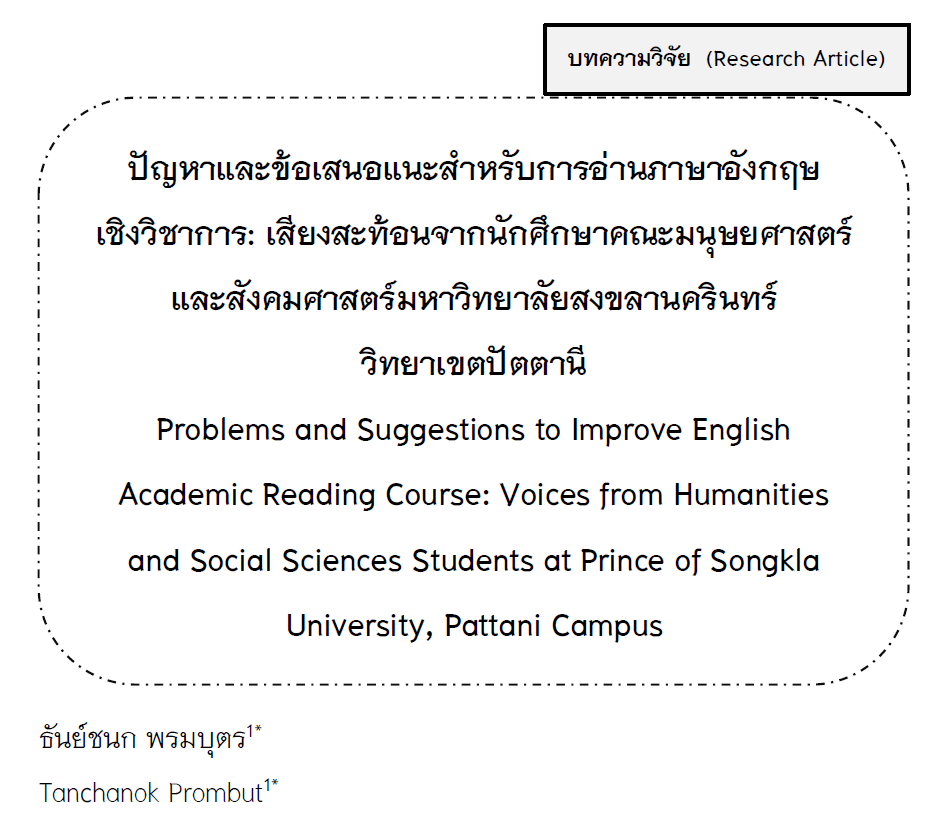Problems and Suggestions to Improve English Academic Reading Course: Voices from Humanities and Social Sciences Students at Prince of Songkla University, Pattani Campus
Keywords:
English Reading Problem, Thai Learners of English, Learners’ Voices and Suggestion, English Academic ReadingAbstract
This study aims to accomplish two main objectives: 1) to explore the English academic reading challenges encountered by students in the Faculty of Humanities and Social Sciences at Prince of Songkla University, Pattani campus, and 2) to provide insights from students to address and overcome these reading challenges. The study involved a total of 103 participants, comprising 78 respondents who completed questionnaires and 25 respondents who participated in interviews. Data analysis from questionnaires revealed significant findings: participants highlighted the importance of increased English content (= 3.62, SD = 0.78), challenges in grammar comprehension (= 3.49, SD = 0.81), the critical role of effective teaching methods in fostering motivation for learning (= 3.42, SD = 0.80), and difficulties in English comprehension ( = 3.29, SD = 0.73). The data analysis from in-depth interviews with students indicates that most students admit to disliking and lacking confidence in learning English, a problem that has persisted since before entering university. However, students are aware of the importance of the English language and express a desire to learn it more. Additionally, they suggest that instructors focus on applying teaching techniques that emphasise a variety of learning activities. They requested greater integration of active learning techniques, rather than solely relying on lectures.
This research stands apart from others as it focuses on investigating the issues and requirements of learners. Moreover, given the predominantly border region population sample, numerous factors may influence learning outcomes. Thus, addressing the concerns and needs of this demographic will aid in pinpointing the causes and origins of challenges and serve as a roadmap for enhancing English academic reading proficiency both effectively and efficiently. By identifying factors impacting academic achievement, it offers insights for devising effective teaching and learning strategies, ultimately bolstering students' English academic reading abilities.
References
Aegpongpaow, O. (2008). A qualitative investigation of metacognitive strategies in Thai students’ English academic reading. (Unpublished master's thesis). Bangkok: Srinakharinwirot University.
Akkakoson, S., & Setobol, B. (2009). Thai EFL students’ use of strategies in reading English texts. The Journal of KMUTNB, 19(3), 329-342.
Almalki, S. (2016). Integrating Quantitative and Qualitative Data in Mixed Methods Research--Challenges and Benefits. Journal of education and learning, 5(3), 288-296.
Anuyahong, B. (2012). A study of English reading strategies and reading motivation used by Thai-Nichi institute of technology students. International Conference on Business and Industrial Research (ICBIR 2012) Thai-Nichi Institute of Technology (171-176). Bangkok.
Boonkongsaen, N., Sujinpram, N., & Verapreyagoon, J. (2016). English reading strategies used by Thai students with different English exposures from different educational Institutions. ABAC Journal, 36(1), 47-67.
Chomchaiya, C., & Dunworth, K. (2008). Identification of learning barriers affecting English reading comprehension instruction, as perceived by ESL undergraduates in Thailand. Proceedings of the EDU-COM International Conference (96-104). Perth, Western Australia: Edith Cowan University.
Chomphuchart, N. (2007). A cognitive-based study of Thai EFL graduate students' reading strategy use. Journal of English Studies, 3, 50-84.
Degang, M. (2010). Motivation toward English language learning of the second year undergraduate Thai students majoring in Business English at an English-medium university. (Unpublished MA thesis). Bangkok: Srinakharinwirot University.
Dewey, M., & Jenkins, J. (2010). English as a Lingua Franca in the Global Context: Interconnectedness, Variation and Change. In M. Saxena, & T. Omonivi (Eds.), Contending with Globalization in World Englishes. Multilingual Matters, 72-86.
Hayikaleng, N., Nair, S. M., & Krishnasamy, H. N. (2016). Thai students’ motivation on English reading comprehension. International journal of education and research, 4(6), 477-486.
Kasemsap, B., & Lee, H. Y. H. (2015). L2 reading in Thailand: Vocational college students’ application of reading strategies to their reading of English texts. The Reading Matrix: An International Online Journal, 15(2), 101-117.
Knapp, K. (2015). English as an international lingua franca and the teaching of intercultural communication. Journal of English as a Lingua Franca, 4(1), 173-189.
Liangpanit, C. (2018). What are the need and problems of English reading for Thai graduate students. Sripatum Chonburi Journal, 14(3), 26-37.
Mauranen, A. (2015). English as a global Lingua Franca: Changing language in changing global academia. In Exploring ELF in Japanese academic and business contexts (29-46). Routledge.
Ninsuwan, P. (2015). The effectiveness of teaching English by using reading aloud technique towards EFL beginners. Procedia-Social and Behavioral Sciences, 197, 1835-1840.
Peregoy, S. F., & Boyle, O. F. (2000). English learners reading English: What we know, what we need to know. Theory into practice, 39(4), 237-247.
Sitthitikul, P. (2010). Curriculum context analysis to support meaningful EFL reading in Thailand. Journal of Studies in the English Language, 5.
Smokotin, V. M., Alekseyenko, A. S., & Petrova, G. I. (2014). The phenomenon of linguistic globalization: English as the global lingua franca (EGLF). Procedia-Social and Behavioral Sciences, 154, 509-513.
Srikrai, P. S., Lin, D., Lakaisone, S., & Sirinthorn, S. (2016). English Language Difficulties of Non-NativeEnglish Postgraduate Students in an English for Academic Purposes at a Thai University. Proceedings of CLaSIC (301–315).
Thamajaree, T., & Sa-ngiamwibool, A. (2014, May). An Investigation of Thai High School Students’ English Language Learning Problems. In International Conference on Education and Language (ICEL).
Thongwichit, N. (2018). Reading in English: What Problems do Students Face in the South of Thailand?. Humanities, Arts and Social Sciences Studies, 18(1), 75-89.

Downloads
Published
How to Cite
Issue
Section
License
Copyright (c) 2024 Phayao University

This work is licensed under a Creative Commons Attribution-NonCommercial-NoDerivatives 4.0 International License.
ผู้นิพนธ์ต้องรับผิดชอบข้อความในบทนิพนธ์ของตน มหาวิทยาลัยพะเยาไม่จำเป็นต้องเห็นด้วยกับบทความที่ตีพิมพ์เสมอไป ผู้สนใจสามารถคัดลอก และนำไปใช้ได้ แต่จะต้องขออนุมัติเจ้าของ และได้รับการอนุมัติเป็นลายลักษณ์อักษรก่อน พร้อมกับมีการอ้างอิงและกล่าวคำขอบคุณให้ถูกต้องด้วย
The authors are themselves responsible for their contents. Signed articles may not always reflect the opinion of University of Phayao. The articles can be reproduced and reprinted, provided that permission is given by the authors and acknowledgement must be given.







